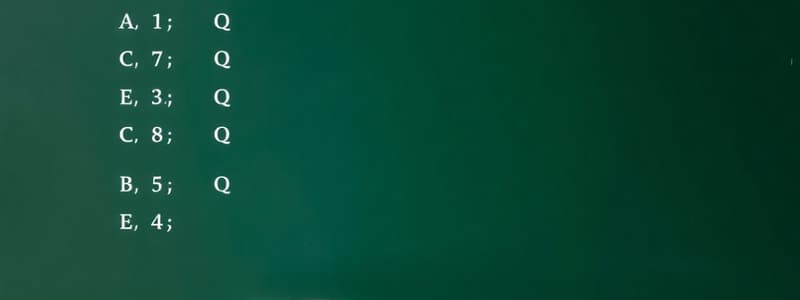Podcast
Questions and Answers
What is a key characteristic of a well-written multiple choice question?
What is a key characteristic of a well-written multiple choice question?
- Ambiguity in answer choices.
- Inclusion of negative statements.
- Use of complex jargon in the stem.
- Clarity and conciseness of the stem. (correct)
Which of the following is NOT an advantage of multiple choice questions?
Which of the following is NOT an advantage of multiple choice questions?
- Ability to cover a broad content area quickly.
- Encouragement of deep understanding. (correct)
- Objective scoring method.
- Efficiency in assessing knowledge.
What type of multiple choice question allows for more than one correct answer?
What type of multiple choice question allows for more than one correct answer?
- Single Correct Answer
- Descriptive Answer
- True/False
- Multiple Correct Answers (correct)
What is a common consequence of using poorly constructed multiple choice questions?
What is a common consequence of using poorly constructed multiple choice questions?
What is a suggested approach when creating plausible distractors in multiple choice questions?
What is a suggested approach when creating plausible distractors in multiple choice questions?
Flashcards are hidden until you start studying
Study Notes
MCQs (Multiple Choice Questions)
Definition
- A type of assessment item that presents a question followed by several answer options.
- Respondents select the correct answer from the given choices.
Structure
- Stem: The question or problem presented.
- Options: Set of possible answers, including:
- Correct answer
- Distractors (incorrect options)
Types of MCQs
- Single Correct Answer: Only one option is correct.
- Multiple Correct Answers: More than one option can be correct.
- True/False: Options are statements that need validation.
Advantages
- Efficient for assessing a wide range of knowledge.
- Provides objective scoring—easy to grade.
- Can cover a broad content area in a shorter time.
Disadvantages
- May encourage guessing.
- Can lead to surface learning rather than deep understanding.
- Poorly constructed questions can confuse test-takers.
Writing Effective MCQs
- Clarity: Ensure the stem is clear and concise.
- Relevance: Questions should align with learning objectives.
- Plausible Distractors: Distractors should be believable to avoid easy elimination.
- Avoid Negatives: Minimize the use of "not" or "except" to prevent confusion.
Scoring
- Typically scored as correct or incorrect.
- Some formats may allow partial credit for multiple correct answer questions.
Use Cases
- Common in standardized testing, quizzes, and exams across various subjects.
- Useful in formative assessments to gauge understanding.
Definition
- Assessment item presenting a question with multiple answer choices for selection of the correct response.
Structure
- Stem: The core question or problem posed.
- Options: Different answer choices, including:
- Correct answer.
- Distractors, which are misleading or incorrect options.
Types of MCQs
- Single Correct Answer: Only one option is accurate.
- Multiple Correct Answers: Several options can be correct simultaneously.
- True/False: Respondents validate statements as true or false.
Advantages
- Efficiently assesses a vast range of knowledge on various subjects.
- Objective scoring mechanism simplifies grading process.
- Covers extensive content in a condensed timeframe.
Disadvantages
- Risks promoting guessing rather than informed answering.
- Tends to encourage surface learning over deeper comprehension of material.
- Poorly phrased questions can result in test-taker confusion.
Writing Effective MCQs
- Clarity: Maintain a clear and concise stem for better understanding.
- Relevance: Questions should directly relate to the established learning objectives.
- Plausible Distractors: Ensure distractors are credible to increase question difficulty.
- Avoid Negatives: Reduce the use of negations like "not" or "except" to avoid misinterpretation.
Scoring
- Generally scored as either correct or incorrect.
- Certain MCQ formats may allow for partial credit in multiple correct answer scenarios.
Use Cases
- Predominantly used in standardized tests, quizzes, and various academic exams.
- Effective in formative assessments to evaluate comprehension and learning progress.
Studying That Suits You
Use AI to generate personalized quizzes and flashcards to suit your learning preferences.




